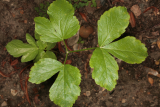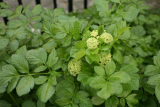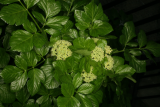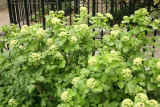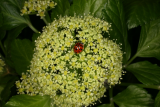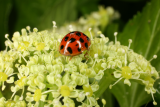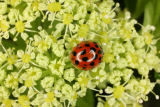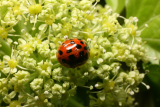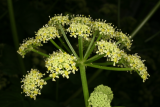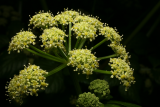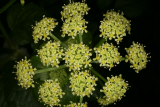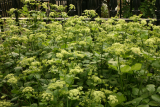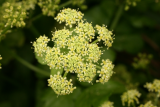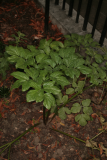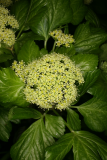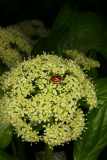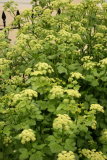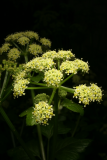Additional notes (click to expand)
Medicinal
Smyrnium olusatrum L. Apiaceae. Alexanders, Black Lovage, Horse Parsley. Distribution: W & S Europe, Mediterranean. Culpeper (1650) writes: ‘Hipposelinum. Alexanders or Alisanders, provoke urine, expel the afterbirth, provoke urine, help the strangury, expel the wind.’ Culpeper has taken this mainly from Dioscorides’ Materia Medica (circa 70 AD). The genus name is said to derive from Smyrna, a city which was founded by Alexander the Great (although there was one which pre-dated his Smyrna). on the Aegean coast of Anatolia. The species name comes from the Latin olus meaning a pot herb (cooking vegetable) and atrum meaning black, in reference to the seeds. It is described as tasting like a rather bitter, second-class celery. The English name may derive from Alexandria or Alexander the Great. It is rarely used in herbal medicine now.
Oakeley, Dr. Henry F. (2013). Wellcome Library notes.
link
Nomenclature
Other Common names: ALISANDERS;BLACK LOVAGE;BLACK POT-HERB;HORSE PARSLEY;STANMARCH;THANET CELERY
The genus name is said to derive from Smyrna, a city which was founded by Alexander the Great (although there was one which pre-dated his Smyrna). on the Aegean coast of Anatolia. The species name comes from the Latin olus meaning a pot herb (cooking vegetable) and atrum meaning black, in reference to the seeds.
Oakeley, Dr. Henry F. (2013). Wellcome Library notes.
link
Other use
This is a truly ancient vegetable, brought to England by the Romans, but now a hedgerow weed in many parts of Britain. Olus means a ‘pot herb’ or vegetable; atrum means black, referring to the black seeds. The name is derived from Smyrna, a city in western Turkey founded by Alexander the Great (356–323 BC) from whom it reputedly gains its common name. Theophrastus noted that the sap was bitter and tasted like myrrh. The leaves and stalks should be boiled and eaten with fish, and the roots pickled or served raw as a salad, according to Dioscorides. The leaves are like celery and the roots like parsnips, according to Mabberley. Lindley reported it as good for flatulence. Culpeper recommended it as a diuretic, for expelling the placenta, ‘opening a stoppage of the liver and spleen’ (whatever this might mean) and for snake bite.
Oakeley, Dr. Henry. (2011). A Year in the Medicinal Garden of the Royal College of Physicians, revised edition. Royal College of Physicians, London. page 41
link
Geographical distribution
- Africa, Macaronesia, Canary Is.
- Africa, Northern Africa, Algeria
- Africa, Northern Africa, Morocco
- Africa, Northern Africa, Tunisia
- Asia-Temperate, Western Asia, Cyprus
- Asia-Temperate, Western Asia, Israel
- Asia-Temperate, Western Asia, Jordan
- Asia-Temperate, Western Asia, Lebanon-Syria
- Asia-Temperate, Western Asia, Turkey
- Europe, Southeastern Europe, Albania
- Europe, Southeastern Europe, Greece
- Europe, Southeastern Europe, Italy
- Europe, Southwestern Europe, France
- Europe, Southwestern Europe, Portugal
- Europe, Southwestern Europe, Spain
Smyrnium olusatrum L.
Family: APIACEAEGenus: Smyrnium
Species: olusatrum L.
Common names: Alexanders
Pharmacopoeia Londinensis name: Olus atrum, Petroselinum Macedonicum
Distribution summary: Mediterranean
Habit: Perennial
Hardiness: H4 - Hardy; average winter
Habitat: Wasteland and roadsides
Garden status: Currently grown
Garden location: Pharmacopoeia Londinensis 1618 'Seeds & Grains' (HSE 8)
Flowering months: April
Reason for growing: Medicinal
